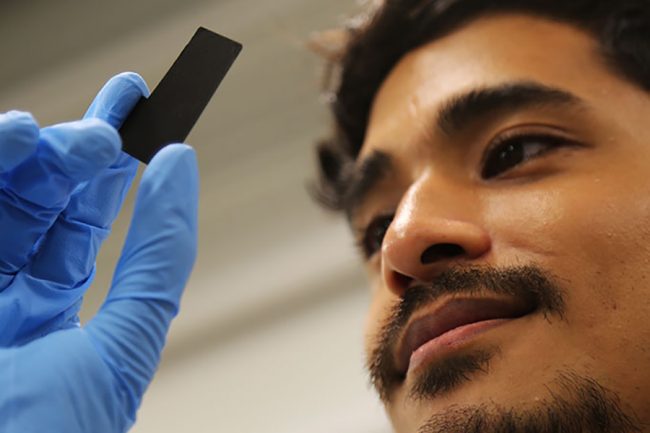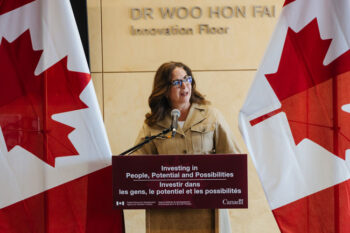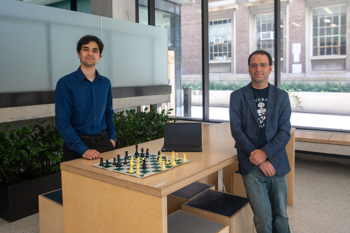Five U of T Engineering graduate students have been named 2019 recipients of the prestigious Vanier Canada Graduate Scholarships.
Worth $50,000 a year over three years, for a total of $150,000, the funding supports leading-edge doctoral research, such as projects in the areas of human health, sustainability and aerospace engineering.
The Vanier Scholarship recognizes doctoral students at Canadian universities who demonstrate excellence academics, research impact and leadership.
This year’s recipients are:
Natalie Landon-Brace (IBBME MD/PhD candidate)
 Landon-Brace’s research aims to identify unique potential drug targets or strategies for treating pancreatic cancer.
Landon-Brace’s research aims to identify unique potential drug targets or strategies for treating pancreatic cancer.
In particular, using the Tumour Roll for Analysis of Cellular Environment and Response – TRACER for short – developed in Alison McGuigan’s (ChemE, IBBME) lab, she will be developing a 3D in vitro model of pancreatic cancer using patient-derived cells, which is as similar as possible to a real tumour.
With this model, she will investigate how the pancreatic tumour microenvironment — the oxygen gradient created between the outer and inner layers of a tumour — impacts the behaviour of tumour-eliminating immune cells, with the goal of identifying potential pathways that could be targeted to enhance the immune response to pancreatic cancer.
“The Vanier will allow me to foster research collaborations beyond U of T, and to spend time garnering expertise from leaders in my field at other institutions in order to infuse innovative strategies into my work here at U of T,” says Landon-Brace.
“Winning the Vanier is a wonderful recognition of the research and community activities I have been a part of to date,” she adds. “It’s also a testament to the opportunities I have been fortunate enough to receive, thanks to my supportive family, friends and colleagues.”
David Philpott (ECE PhD candidate)
 Philpott studies under the supervision of Professor Ted Sargent (ECE) and co-supervisor Professor Shana Kelley of the Leslie Dan Faculty of Pharmacy. His research aims to leverage a magnetic-based microfluidic platform to perform large cell-based screens.
Philpott studies under the supervision of Professor Ted Sargent (ECE) and co-supervisor Professor Shana Kelley of the Leslie Dan Faculty of Pharmacy. His research aims to leverage a magnetic-based microfluidic platform to perform large cell-based screens.
Potential applications of this work include CRISPR loss-of-function screens in cancer and stem cells as well as on-cell synthetic antibody screening.
In addition to his research, Philpott is also an active volunteer in his community, mentoring with Big Brothers Big Sisters of Toronto and serving on the executive committee at U of T Engineering.
“Being recognized by experienced researchers who see potential in me and my work means a lot to me,” says Philpott. “The Vanier award gives me the freedom to focus on my research rather than managing other grant applications or finances — I can invest my energy completely into the research I love and hopefully one day see my work have a real-world impact on a patient.”
Pranay Shrestha (MIE PhD candidate)
 Shrestha has been fascinated with waterfalls and the movement of water from a young age. Now as researcher under the supervision of Professor Aimy Bazylak (MIE), he studies how water moves, but at a much smaller scale.
Shrestha has been fascinated with waterfalls and the movement of water from a young age. Now as researcher under the supervision of Professor Aimy Bazylak (MIE), he studies how water moves, but at a much smaller scale.
His research focuses on the movement of water through microscopic pores in energy conversion devices called fuel cells. Shrestha’s goal is to improve fuel-cell efficiency to enable a sustainable zero-emission energy infrastructure.
“I am extremely humbled to receive this award,” he said. “To me, it represents the idea that dreams are within reach, given focused effort.”
André Marchildon (UTIAS MASc 1T9, PhD candidate)
 With the global population rising, sustainable transportation solutions are crucial. The design of existing sustainable aircrafts is based on research that only considers controlled and steady aircraft flow environments.
With the global population rising, sustainable transportation solutions are crucial. The design of existing sustainable aircrafts is based on research that only considers controlled and steady aircraft flow environments.
Under the supervision of Professor David Zingg (UTIAS), Marchildon is investigating how to optimize the design of aircrafts under more realistic conditions that consider the effects of turbulence and other unsteady flow environments. The aim of this research is to influence how future aircrafts are designed in order to create a more sustainable future for flight.
Marchildon just completed his master’s degree with Zingg and received the Vanier Award for his doctoral studies.
“It is an honour to receive this prestigious award and to be acknowledged for the hard work I’ve done,” he says. “Winning this award will advance my research and open doors for other opportunities to meet like-minded people.”
Prajay Shah (IBBME MD/PhD candidate)
 Shah’s work is focused on developing new engineering and technological solutions for epilepsy patients. Specifically, as a neuroscientist, he’s interested in better understanding the principles of seizures and how they spread in the brain to inform the development of novel neural control devices being developed in the lab.
Shah’s work is focused on developing new engineering and technological solutions for epilepsy patients. Specifically, as a neuroscientist, he’s interested in better understanding the principles of seizures and how they spread in the brain to inform the development of novel neural control devices being developed in the lab.
“Winning the Vanier to me shows that Canada is serious about being a leader in scientific advancement,” he says. “It is awards like the Vanier that attract the top tier of doctoral students to Canadian research institutions and give them the freedom to pursue research.”



